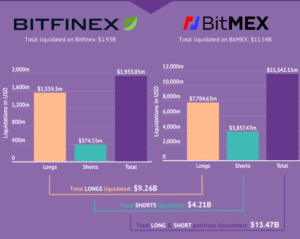https://dynamicbusiness.com/leadership-2/lets-talk-business/lets-talk-should-i-trust-cryptocurrency-with-my-business.html
Cryptocurrencies are used for a variety of purposes by people. Some people buy cryptocurrencies with the assumption that their value will rise.
Whatever your financial strategy, there is a good chance that cryptocurrencies will affect you and the way you do business in the future. However, there is still a lot of uncertainty surrounding the use of bitcoin in business. Elon Musk, Tesla’s self-proclaimed “TechnoKing,” has recently received a lot of media attention. Recently, In a letter to its shareholders, Tesla Inc. disclosed that it has sold more than 75 per cent. He did point out that the selling shouldn’t be taken as a verdict on bitcoin, but it was just enough to cause a small decline in price.
In this week’s Let’s Talk, we asked our experts about their opinions on whether or not cryptocurrencies are reliable for SMEs.
Let’s Talk.
Discover Other Let’s Talk Business Topics
Robin Marchant, Director of Marketing APAC, Shopify

“When it comes to cryptocurrency, its potential uses are almost limitless. Beyond the investor debate, it’s fast gaining momentum as a payment option for businesses looking for faster transactions, lower processing fees, no chargebacks and support for local and international purchases.
“Today, enabling cryptocurrency in your business is simpler than you think. In fact, Shopify merchants have been able to accept crypto for payment since 2018 through platforms like Coinbase and Bitpay, with the confidence of knowing that Shopify provides the right systems and resources to support merchants.
“However, cryptocurrency is more volatile than traditional currencies and there are operational considerations to take into account, such as tracking trades, payments, receipts, and how to store the currency securely. For any business considering entering the market, it’s important to get a solid understanding of the space, and work with a trusted adviser who has the knowledge to help your business handle crypto payments.”
Sharon Williams, Founder and CEO, Taurus

“Crypto is fascinating for me as I work in the technology industry, so I am used to reviewing, investigating and testing running all things new and groundbreaking. Digital currency is no different, and yes, because we offer comms strategies to crypto entrepreneurs, we see it actively being used for business already. Is it trustworthy is hard to answer because it is like asking for money is trustworthy. It’s what you do with the money or the cryptocurrency that is more the question. Who knows where the future will go, but it has created a new way of thinking.
“We may be on the edge of global change, or we may be at the start of something that – even if it has a series of false starts – will create so much change – it paves a new future. Either way, I am enjoying the investigation, usefulness, application and the various technologies and rules that make up digital currencies. For me, personally, my team are bonused in cryptocurrencies when they work on Crypto clients to enable them to get in, test and see for themselves what the market is all about.”
Shannon Karaka, Head of Expansion ANZ, Deel

“According to Deel’s State Global Hiring 2022 Report, remuneration payments in the form of crypto have held steady the last six months, with ~5 per cent of all payments withdrawn from the Deel platform having been taken in crypto since January 2022. Crypto can be an attractive option for people who want to hedge against currency volatility, get paid faster or simply want to add crypto to their investment portfolio. They may also choose to take their pay in multiple crypto and non-crypto currencies to diversify further. And with more and more companies feeling the brunt of the skills shortage, any perk that affords workers greater flexibility should be welcomed.
“For businesses looking to transact with customers and suppliers in crypto, partnering with a reputable third party with the proper checks and compliance measures is crucial. This also applies to those looking to pay contractors in crypto, though an additional consideration should be to consider offering a choice of currency. For example, people may want to be paid in a stablecoin like USDC, which has historically been less volatile and thus provides greater income security.”
Pete Murray, Managing Director ANZ, Veritas Technologies

“The prospect of innovation can be tempting for business leaders looking to incorporate new technologies into their operations. Unfortunately, big opportunities usually come with equally big risks, with a lack of understanding leaving early adopters exposed from a security perspective.
“This can be said for cryptocurrencies, with the ACCC reporting that Aussies lost more than $205 million to scams in the first four months of 2022 – the majority resulting from ‘crypto-investment scams’, which saw an increase of over 300 per cent.
“Businesses should be wary of anyone making money transfer requests using cryptocurrency, as well as scammers taking advantage of employees unfamiliar with the complexities of crypto. Such demands should raise red flags as cryptocurrency is neither a legal tender nor regulated in Australia.
“Cryptocurrencies can also be used as a tool to aid ransomware attacks, with threat actors evolving their tactics and stealing precious company data in exchange for crypto payments.
“Tips for businesses to avoid getting caught include:
- Ensure employees are educated to identify and report suspicious online threats
- Have strict policies in place for processing business payments
- Regularly backup and encrypt company data, alongside an effective recovery strategy”
Kevin He, CEO, Cloudtech Blockchain Australia

“The advantages of cryptocurrencies such as Bitcoin for businesses largely outweigh the disadvantages.
“Research by Marella et al (2020), which is insightful in establishing what creates trust in cryptocurrencies for business owners. suggests that ‘coin transfers, immutability, openness, and decentralization are the functional attributes of Bitcoin, responsible for creating trust among the users’.”
“Immutability refers to the fact that crypto transactions cannot be manipulated, reversed or changed by anyone.
“Decentralisation means there are no third parties involved in the transaction process – therefore, any activity on the blockchain is transparent and can be seen by anyone, which enables trust to be built among users.
“Other benefits for business owners include complete control of assets for consumers; an extra layer of protection for traders; and any fraudulent transactions can be traced back to the blockchain.
“On the downside, there is still a lack of regulation in the crypto market. This makes the market more unpredictable and has resulted in most currencies not being backed or insured, unlike fiat currencies.
“However, these disadvantages are overcome by the significant benefits, including trustworthiness, cryptocurrencies have to offer for businesses.”
Carly Eva Benci, Founder, Crypto Carly

“Cryptocurrencies provide an immediate, indisputable means to receive and make payments to suppliers or clients, improving cash flow and saving time chasing up unpaid invoices.
“From the landscaper receiving immediate payment on job completion to an importer sending funds to his overseas supplier, the fees and time are the same – low and fast!
“As a working Mum of four beautiful children, I’ve spent the past five years investing in and studying cryptocurrencies. I’ve learnt so much about this exciting industry, and as a result, I am founding a business that educates others on how to navigate the digital and crypto worlds so they, too can create investment or business opportunities for themselves.
“It’s an exciting time for humanity as digital currencies, digital assets, and digital worlds become everyday aspects of our lives, just as the internet did in the 90s and social media in the 2000s – this is the next digital revolution changing our world!”
Lachlan Feeney, Founder and Executive Director, Labrys

“Many businesses will have been looking at the carnage in the cryptocurrency markets over recent months and asking themselves, ‘is this something that we can trust?’ However, that really isn’t the right question. It’s like asking whether the internet is trustworthy enough for businesses to use in their business operations. The right question to ask is which platform or sites on the internet are trustworthy and in the case of blockchain, which cryptocurrencies are trustworthy for business and which ones are not. Whilst the industry remains immature, this can be a difficult question to answer, particularly for those new to the blockchain industry. However, as the technology matures and regulatory clarity is provided, in hindsight, it will seem crazy that businesses, even as late as 2022, were still debating whether or not cryptocurrencies and blockchain technology would become core to day-to-day business operations. The answer is, they will.”
Nathan Reichstein, Chairman of Business Advisory Committee, Moore Australia

“It’s not an easy question to answer because it involves two issues: security and stability. In relation to security, cryptocurrencies are inherently secure in nature, given that blockchain technology is underpinned. The blockchain is a ledger that keeps track of the ownership of cryptocurrency, and it’s more difficult for hackers to access your funds.
“Whether or not you should use it in your business comes down to a whole range of issues. As we have seen over the last few months, cryptocurrencies are extremely volatile in nature. If you sold products in exchange for 10 ether in December 2021, it would have been worth approximately AU$50,000. If you left it alone and did not touch it, it would be worth around AU$16,400 on June 22. For a layperson who does know enough about how the entire ecosystem works, it is probably not worth taking such risks within your business operations.”
Rick McElroy, Principal Cybersecurity Strategist, VMware

“The short answer is it depends. Some businesses are built around cryptocurrencies, so for them, the answer is yes. For other businesses, there are many applications of cryptocurrencies that could make sense. Perhaps they are a gaming company looking to offer currency in the Metaverse. Perhaps they see creating their own coin for use in their own ecosystem as a strategic business advantage.
“Cryptocurrencies do, however, present risks. Numerous exchange hacks have brought the entire system into question, and crypto hijacks and theft occurs almost daily. An organisation suddenly being responsible for its own currency’s security may find itself ill-prepared unless there is a very carefully planned strategy to account for the threats against it. Finally, it’s worth noting that the market is extremely volatile for businesses using standard cryptocurrencies like Bitcoin and Ethereum.”
Wassim Dabboussi, CMO and Head of Community Engagement, Breakout Solutions

“Cryptocurrencies, by design, are the most secure method for two parties to transact without needing a third-party intermediary. Having said that, with the current lack of regulation in many countries, cryptocurrencies can present many risks for the business sector.
“These risks have not hindered the growing adoption of cryptocurrencies by businesses of many sizes and from several industries. There are many examples of this.
“It’s becoming more widely accepted that cryptocurrencies are the way of the future and will disrupt nearly every business sector in some way. It is imperative for businesses to be educated about the crypto space and understand how to adopt cryptocurrencies whilst minimizing risk.
“Businesses that adopt cryptocurrencies now will be ahead of the curve and will set themselves up for longevity and prosperity. However, before embarking on a journey into this ever-evolving space, it is important for business owners to have the skills and knowledge required to safely and securely incorporate digital assets onto their balance sheets and into their payment solutions.
“This is what we do at Breakout Solutions – we provide comprehensive educational opportunities that businesses can use to safely and securely adopt cryptocurrencies.”
Todd Lenfield, Country Manager ANZ, Chainalysis

“When comparing legitimate and criminal usage, illicit activity’s share of crypto volume has never been lower and is shrinking as an overall proportion of the cryptocurrency ecosystem. Transactions involving illicit addresses represented just 0.15 per cent of cryptocurrency transaction volume in 2021, nearly ten times lower than in 2017.
“The fact that ANZ and CBA, which have mountains of legislation to comply with, are confident launching various crypto services only goes to show that with the right tools and processes in place, businesses can feel safe offering and accepting crypto.
“Most businesses looking to accept crypto as payment for goods or services will do so through a third-party platform or exchange, so the main thing to do is to look for a reputable provider that is compliant with local regulation and has strong customer protections in place.
“Cryptocurrency has become much safer as adoption has grown. The space has become increasingly more well understood by regulators, who are working to provide better protections for businesses and consumers. It is predicted that this will become more heavily enforced within 6-12 months.”
Lisa Wade, CEO, DigitalX

“We’re witnessing the start of increasingly rapid mainstream adoption of crypto and digital asset investments as institutions become meaningfully involved. The rise of tokenised assets will unlock innovative new business models within the economy, leading consumers, corporates and investors to demand services that enable effortless access to web3. Crypto has the opportunity to allow Australian corporates to transact cheaper, smarter and faster.”
Discover Let’s Talk Business Topics
Keep up to date with our stories on LinkedIn, Twitter, Facebook and Instagram.



















